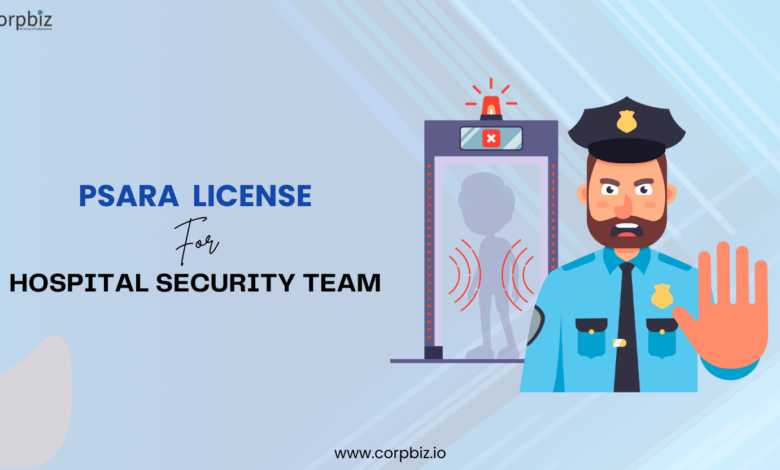
The need for security in hospitals cannot be overstated. Hospitals and healthcare facilities deal with vulnerable patients, expensive equipment, and sensitive data, all of which require robust security measures. One essential step to ensure effective security is hiring a security team with a PSARA License. The Private Security Agencies (Regulation) Act (PSARA) was introduced in India to regulate and standardize the operations of private security agencies. This blog will delve into the significance of the PSARA License for hospital security, the process of PSARA License online registration, and why obtaining a PESO Certification can add an additional layer of compliance and trustworthiness.
Understanding the PSARA License and Its Importance in Hospital Security
The PSARA License is a mandatory certification for private security agencies operating in India. It ensures that security agencies adhere to quality standards, maintain accountability, and are monitored for compliance. In a hospital setting, this license is critical as it offers several advantages:
- Ensures Compliance: PSARA ensures that the security personnel employed by the agency are trained to handle emergencies, patient disputes, and sensitive situations typical in hospitals.
- Guarantees Professional Standards: Security agencies with a PSARA License must adhere to high standards in recruitment, training, and operation. This means that hospitals get a reliable and well-trained security team.
- Reduces Legal Liability: By hiring a PSARA-licensed agency, hospitals minimize potential legal issues arising from non-compliance or negligence, safeguarding the institution’s reputation and compliance with Indian guidelines.
How to Apply for a PSARA License Online Registration
Obtaining a PSARA License Online Registration is a straightforward process, which is essential for security agencies aspiring to work with reputable institutions like hospitals. Here are the primary steps involved:
- Eligibility Check: The security agency must be registered under relevant Indian laws and must employ individuals who meet age, physical fitness, and background verification standards.
- Document Submission: Documents such as identity proof, company incorporation certificates, income tax returns, and experience certificates of senior personnel are required for the PSARA application.
- Training Compliance: PSARA mandates training for all security personnel in skills like crowd management, emergency response, and handling of medical situations.
- Inspection & Approval: After verification of documents and background checks, an inspection is conducted by the licensing authority. Upon successful completion, the agency receives the PSARA License.
Why Hospitals Should Prioritize PSARA-Licensed Security
With rising incidents of security breaches in hospitals, the need for PSARA-compliant security has become more significant. Here are a few reasons why hospitals must prioritize pasara security licence for their security team:
- Enhanced Patient and Staff Safety: Hospitals are responsible for the safety of patients, visitors, and staff. PSARA-licensed security teams are trained to handle various situations, from patient altercations to emergency evacuations.
- Compliance with Legal Standards: Hospitals must follow government regulations, including PSARA, to prevent any legal complications. With a PSARA license, hospitals demonstrate compliance, protecting the organization from potential liabilities.
- Efficiency in Handling Medical Emergencies: Security staff in hospitals often deal with emergencies. A PSARA-compliant team ensures security personnel are well-trained and reliable during critical situations.
- Reputation Management: A hospital with PSARA-licensed security gains credibility and trust. In emergencies, a competent security team can manage the situation effectively, protecting the hospital’s image.
Adding a Layer of Compliance with PESO Certification
In addition to the PSARA License, obtaining a PESO Certification (Petroleum and Explosives Safety Organization) is beneficial for hospitals, especially for those handling hazardous materials or emergency medical services. Here’s how a PESO certificate can further secure a hospital:
- Ensuring Safe Handling of Hazardous Materials: Hospitals often use gases, chemicals, and other potentially dangerous substances in medical procedures. A PESO certificate certifies that security staff is aware of the correct protocols to handle these materials safely.
- Compliance with Government Regulations: Hospitals with a PESO approval demonstrate adherence to government safety regulations, enhancing their credibility and ensuring a safer working environment.
- Mitigating Risks in Emergencies: Hospitals dealing with hazardous substances benefit from having a PESO-certified security team. During incidents involving fire hazards, for instance, PESO-compliant personnel can execute rapid and safe evacuation plans.
How to Obtain a PESO Certification
To ensure comprehensive security, hospitals may encourage or require their security teams to acquire a PESO approval. Here’s a brief outline of the process:
- Application Submission: The hospital must submit an application with relevant documents, detailing the storage and handling procedures for hazardous materials.
- Inspection by PESO Officials: PESO officials carry out inspections to ensure the hospital complies with safety standards.
- Approval and Certification: After meeting all requirements, the hospital is granted PESO Certification, affirming its commitment to safety.
Steps to Build a Strong, PSARA-Licensed Hospital Security Team
- Choose a Reputable Security Agency: Ensure the agency has a pasara security licence and is familiar with the specific needs of hospital environments.
- Emphasize Training on Health-Specific Security: A hospital setting has unique challenges. Training in crowd management, emergency handling, and patient interaction is essential.
- Encourage PESO Certification for Hazardous Material Handling: Hospitals using hazardous materials should prioritize security staff familiar with PESO Certification requirements.
- Conduct Regular Audits and Training Updates: Security requirements in hospitals may change, so it’s essential to keep the security team’s training up-to-date.
Conclusion
For hospitals, investing in a PSARA-licensed security team is essential to meet safety standards and reduce liability. A security agency with a Pasara Security Licence provides qualified personnel who are trained and prepared to handle the unique challenges of a healthcare setting. Additionally, obtaining a PESO Certificate adds an extra layer of compliance and safety, especially for hospitals dealing with hazardous materials. The combination of PSARA and PESO Certifications ensures that hospitals provide a safe, compliant, and trustworthy environment for their patients and staff.
FAQs
- What is the difference between a PSARA License and a PESO Certificate for hospital security?
- The PSARA License is specific to private security agencies and ensures that their personnel are trained and compliant with Indian security standards. A PESO Certificate, on the other hand, is relevant for handling hazardous materials, which is useful for hospitals that store such substances.
- Is it mandatory for hospital security agencies to have a PSARA License?
- Yes, according to Indian law, any private security agency must obtain a pasara security licence to operate legally. For hospitals, hiring a PSARA-licensed agency ensures that they meet essential compliance standards and mitigate legal risks.
- How can a PESO Certification benefit a hospital?
- A PESO Certification confirms that a hospital follows government-approved safety protocols for hazardous material handling, reducing risk and ensuring a safer environment for patients and staff.
Source URL: https://www.leenkup.com/read-blog/23859_why-your-hospital-s-security-team-needs-a-psara-license.html


